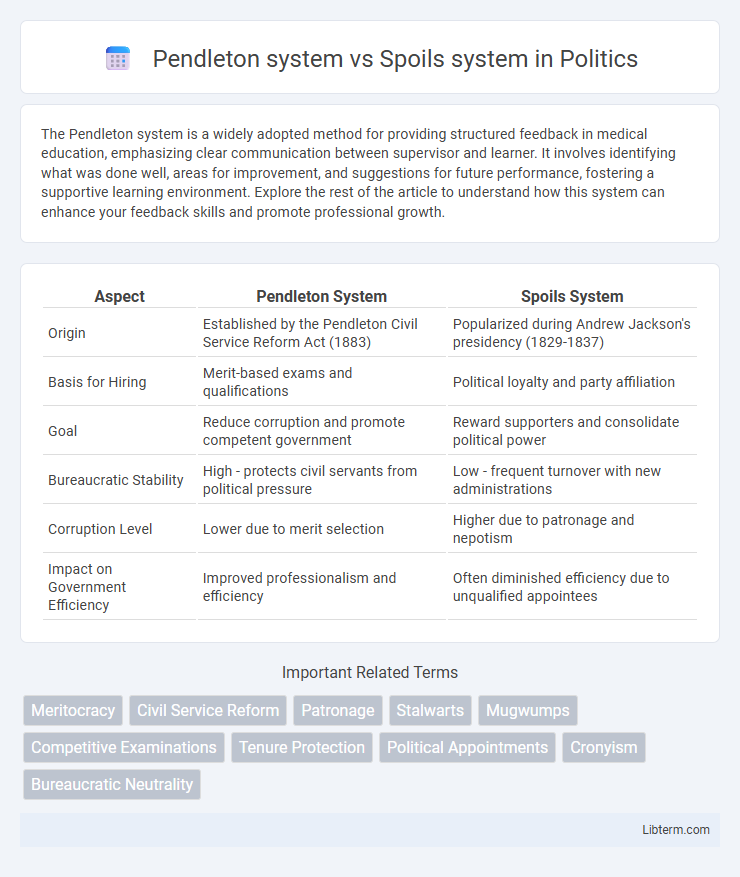The Pendleton system is a widely adopted method for providing structured feedback in medical education, emphasizing clear communication between supervisor and learner. It involves identifying what was done well, areas for improvement, and suggestions for future performance, fostering a supportive learning environment. Explore the rest of the article to understand how this system can enhance your feedback skills and promote professional growth.
Table of Comparison
| Aspect | Pendleton System | Spoils System |
|---|---|---|
| Origin | Established by the Pendleton Civil Service Reform Act (1883) | Popularized during Andrew Jackson's presidency (1829-1837) |
| Basis for Hiring | Merit-based exams and qualifications | Political loyalty and party affiliation |
| Goal | Reduce corruption and promote competent government | Reward supporters and consolidate political power |
| Bureaucratic Stability | High - protects civil servants from political pressure | Low - frequent turnover with new administrations |
| Corruption Level | Lower due to merit selection | Higher due to patronage and nepotism |
| Impact on Government Efficiency | Improved professionalism and efficiency | Often diminished efficiency due to unqualified appointees |
Introduction to Civil Service Systems
The Pendleton System established merit-based hiring and promotion in federal civil service, reducing patronage and corruption associated with the Spoils System, which awarded government jobs based on political loyalty. Implemented after the 1883 Pendleton Civil Service Reform Act, the Pendleton System introduced competitive exams and protections from political dismissal. This shift emphasized professional qualifications and aimed to create a more efficient and impartial public administration.
Defining the Pendleton System
The Pendleton System, established by the Pendleton Civil Service Reform Act of 1883, mandates hiring and promoting government employees based on merit and competitive exams, replacing the Spoils System's patronage-driven appointments. This reform aims to reduce corruption and increase efficiency by ensuring positions are filled by qualified individuals rather than political supporters. The system introduced the Civil Service Commission to enforce merit-based criteria and protect employees from political pressure and arbitrary dismissal.
Understanding the Spoils System
The Spoils System, also known as patronage, involved awarding government jobs to political supporters and allies as a reward for their loyalty, often leading to corruption and inefficiency in public office. In contrast, the Pendleton Civil Service Reform Act of 1883 established the Pendleton system, which introduced merit-based hiring through competitive exams to ensure qualified candidates filled government positions. Understanding the Spoils System highlights the necessity of reforms like the Pendleton system to promote professionalism and reduce nepotism in the civil service.
Historical Context and Origins
The Pendleton System originated in the late 19th century after the assassination of President James A. Garfield, aiming to replace the corrupt and inefficient Spoils System prevalent during the Jacksonian era. The Spoils System, dominant in the early to mid-1800s, rewarded political supporters with government jobs as a form of patronage, leading to widespread nepotism and incompetence. The Pendleton Civil Service Reform Act of 1883 established merit-based hiring, fundamentally reshaping American public administration and curbing the abuses forged by the Spoils System.
Key Differences Between the Two Systems
The Pendleton system emphasizes merit-based hiring and promotion through competitive exams, reducing political patronage and corruption, while the Spoils system rewards political supporters with government jobs regardless of qualifications. The Pendleton system promotes stability and professionalism in civil service, whereas the Spoils system often leads to inefficiency and frequent turnover based on political changes. Pendleton's reforms established regulations to protect government employees from partisan dismissal, contrasting sharply with the Spoils system's emphasis on loyalty over competence.
Impact on Government Efficiency
The Pendleton system improved government efficiency by implementing merit-based hiring and promotion, reducing corruption and patronage inherent in the Spoils system. By promoting qualified individuals through competitive exams, it enhanced administrative competence and stability in federal agencies. The Spoils system, characterized by appointing loyal supporters regardless of qualifications, often led to inefficiency and frequent turnover, undermining consistent policy implementation.
Effects on Political Corruption
The Pendleton system significantly reduced political corruption by establishing a merit-based approach to federal employment, minimizing patronage and the influence of political favoritism in government hiring. In contrast, the Spoils system promoted corruption through widespread patronage, rewarding loyal supporters with government jobs regardless of qualifications, which fostered inefficiency and bribery. The shift to the Pendleton system marked a crucial reform in promoting accountability and professionalism within public administration.
Merit vs. Patronage: Pros and Cons
The Pendleton System emphasizes merit-based hiring and promotion through competitive exams, ensuring skilled and qualified public servants, which enhances government efficiency and reduces corruption risks. In contrast, the Spoils System relies on patronage, rewarding political supporters with jobs regardless of competence, potentially fostering loyalty but often leading to inefficiency and nepotism. While the Pendleton System promotes professionalism and continuity, the Spoils System can undermine institutional knowledge and increase political favoritism.
Evolution of U.S. Civil Service Laws
The Pendleton Civil Service Reform Act of 1883 marked a significant shift from the Spoils System by introducing merit-based hiring and protection against political patronage, fundamentally transforming U.S. civil service laws. This evolution curbed the widespread, corrupt practice of awarding government jobs as political rewards under the Spoils System, promoting efficiency and professionalism in federal employment. Subsequent reforms have built on the Pendleton Act's foundation, expanding merit principles and reinforcing civil service protections to modernize the U.S. bureaucracy.
Legacy and Modern Relevance
The Pendleton system, established by the Pendleton Civil Service Reform Act of 1883, laid the foundation for a merit-based federal workforce, significantly reducing patronage and corruption associated with the Spoils system, which allocated government jobs based on political loyalty. Its legacy endures in modern public administration through competitive exams and protections against political dismissals, promoting efficiency and professionalism in government services. Contemporary relevance is evident as the Pendleton system continues to inspire civil service reforms worldwide, emphasizing meritocracy and transparency in public sector employment.
Pendleton system Infographic

 libterm.com
libterm.com